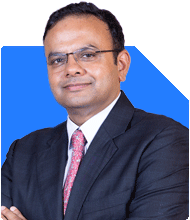Ramalingam Kalirajan |10906 Answers |Ask -Follow
Mutual Funds, Financial Planning Expert - Answered on May 15, 2024
He has an MBA in finance from the University of Madras and is a certified financial planner.
He is the director and chief financial planner at Holistic Investment, a Chennai-based firm that offers financial planning and wealth management advice.... more

I have monthly SIP 5K each in in Parag parikh flexi cap, Hdfc flexi cap, Nippon smal cap, ICICI value discovery , ABSL digital, DSP health care, ICICI banking, UTI next 50, motilal fund of fund
Diversification Assessment
Your portfolio exhibits a diversified mix across multiple fund categories, which is commendable. It encompasses flexi cap, small cap, value discovery, thematic, sectoral, and index funds. This diversification strategy spreads risk and maximizes potential returns.
Analysis of Fund Selection
Each fund category serves a specific purpose in your portfolio. Flexi cap funds offer flexibility to invest across market capitalizations, capturing growth opportunities efficiently. Small cap funds have the potential for high growth but come with increased volatility, suitable for long-term investors with a higher risk tolerance.
Value discovery and thematic funds provide exposure to undervalued stocks and emerging sectors, respectively, contributing to alpha generation. Sectoral funds like healthcare and banking focus on specific industries, offering targeted exposure and potential for outperformance during sectoral upswings.
Sectoral funds focus on one industry, so they're like putting all your eggs in one basket. If that industry struggles, your whole investment can suffer. They also tend to be more volatile than diversified funds. Consider a broader mix for a more balanced approach.
Active vs. Passive Management
While passive index funds and ETFs have gained popularity for their low costs and broad market exposure, your portfolio emphasizes actively managed funds. Actively managed funds offer the advantage of professional fund management, allowing active decisions to capitalize on market inefficiencies and generate alpha.
Importance of Regular Funds
Investing through a Certified Financial Planner can provide access to regular funds, which offer personalized advice, portfolio monitoring, and rebalancing. This approach ensures informed investment decisions tailored to your financial objectives, compared to direct investing, which may lack professional guidance and discipline.
Monitoring and Rebalancing Strategy
Regular portfolio review is essential to ensure alignment with changing market dynamics and your evolving financial goals. Periodic rebalancing maintains the desired asset allocation, mitigating risk and optimizing returns over the long term.
Conclusion
Your investment portfolio reflects a well-thought-out strategy with diversification across various mutual fund categories. Emphasizing actively managed funds and leveraging the expertise of a Certified Financial Planner can enhance portfolio performance and mitigate risk effectively.
Best Regards,
K. Ramalingam, MBA, CFP,
Chief Financial Planner,
www.holisticinvestment.in
You may like to see similar questions and answers below
Abhishek Dev | Answer |Ask -Follow
Financial Planner - Answered on Aug 29, 2023
Ramalingam Kalirajan |10906 Answers |Ask -Follow
Mutual Funds, Financial Planning Expert - Answered on May 30, 2024
Ramalingam Kalirajan |10906 Answers |Ask -Follow
Mutual Funds, Financial Planning Expert - Answered on May 30, 2024
Ramalingam Kalirajan |10906 Answers |Ask -Follow
Mutual Funds, Financial Planning Expert - Answered on May 30, 2024
Ramalingam Kalirajan |10906 Answers |Ask -Follow
Mutual Funds, Financial Planning Expert - Answered on Dec 19, 2025
Nayagam P P |10859 Answers |Ask -Follow
Career Counsellor - Answered on Dec 19, 2025
Ramalingam Kalirajan |10906 Answers |Ask -Follow
Mutual Funds, Financial Planning Expert - Answered on Dec 19, 2025
Ramalingam Kalirajan |10906 Answers |Ask -Follow
Mutual Funds, Financial Planning Expert - Answered on Dec 19, 2025
Ramalingam Kalirajan |10906 Answers |Ask -Follow
Mutual Funds, Financial Planning Expert - Answered on Dec 19, 2025
Radheshyam Zanwar |6751 Answers |Ask -Follow
MHT-CET, IIT-JEE, NEET-UG Expert - Answered on Dec 19, 2025
Radheshyam Zanwar |6751 Answers |Ask -Follow
MHT-CET, IIT-JEE, NEET-UG Expert - Answered on Dec 19, 2025
Samraat Jadhav |2514 Answers |Ask -Follow
Stock Market Expert - Answered on Dec 18, 2025
Reetika Sharma |432 Answers |Ask -Follow
Financial Planner, MF and Insurance Expert - Answered on Dec 18, 2025
Reetika Sharma |432 Answers |Ask -Follow
Financial Planner, MF and Insurance Expert - Answered on Dec 18, 2025
























